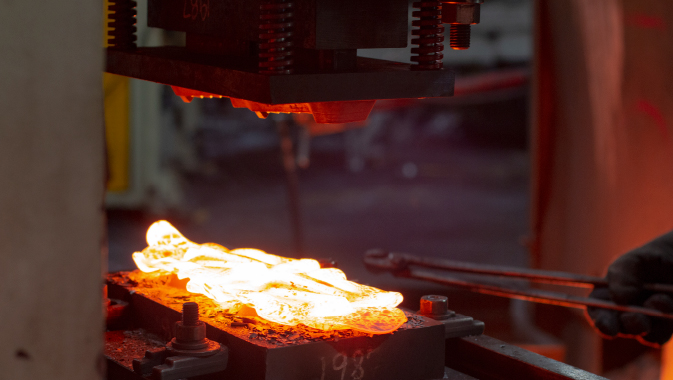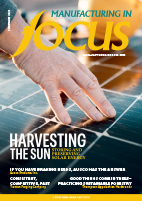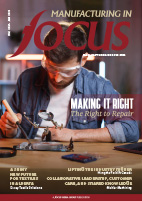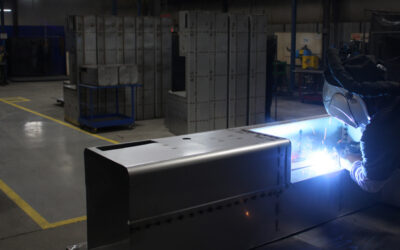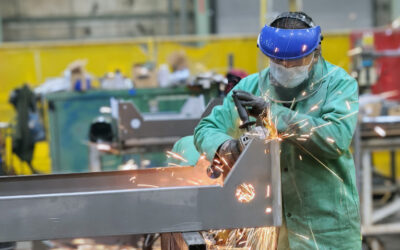Necessity is said to be the mother of invention. While this certainly is the case, it may also give rise to innovation. Trenton Forging Company uses innovation and modern technology to rescue clients from difficult situations after product failures and similar challenges. By implementing – and also slightly bending – basic design principles, the company has prevented a number of impending disasters.
“We have solved problems within two weeks that would usually take two years. This is why I believe we are the best in the industry at being flexible, innovative, and at getting [work] done,” says Dane Moxlow, Director of Markets and Innovation.
Based at its 85,000-square-foot facility in Trenton, Michigan, the company is favored by its clients in the military, railroad, automotive, agricultural, and trucking sectors for its speed, efficiency, and innovation, especially when it comes to steel forging and its complementary services.
Trenton Forging Company is popular with clients from across North America, Europe, and China for its innovative ideas and customer care. Its approach to technology is also proving successful with its clients. Some of the world’s largest automotive suppliers and smaller, specialist operators all trust Trenton Forging Company to come up with unique, quality solutions to their forged steel component challenges.
The team offers a host of quality services like three-dimensional laser scanning to allow for instant part replication, three-dimensional printing, die welding, engineering, forging, machining, and forge tooling.
As forgings and castings are often indiscernible to the untrained eye, it might be helpful to underline the main differences between the two processes. Foundries cast metals by pouring liquefied material into molds, shaping it into the desired form but without adding to its strength. In contrast, hot-forging applies force to shape raw material in its plastic state while retaining its original grain structure, giving it considerably increased strength and durability.
“I think we are way ahead of the curve in our industry as far as creativity and innovation in manufacturing goes,” says Dane. He and his sister Chelsea Lantto, Director of Manufacturing, are especially proud of the company’s design and engineering department’s capacity for problem-solving. “We prefer to design things around subsequent processes that make the next manufacturing step easier and more cost-effective, whether it is done here or at our customer’s facility,” says Dane.
With this mindset as the basis of its philosophy, Trenton Forging Company is also well known for producing custom work that other operators of its size typically cannot. It prides itself on staying up-to-date with the latest technology, while a state-of-the-art onsite tooling facility gives it several distinctive capabilities.
Some significant recent upgrades to its overall equipment collection include new, state of the art induction heating units, all-new forging secondary operation presses, as well as automation for key basic processes. The latter enables improved data collection as well as repeatability, especially in terms of administration, assembly, and small-scale quality checks.
The company is driven by ninety-four dedicated industry experts. “We have always known that our people are our biggest asset. Because we are the third generation, it is important to Dane and me that we [create] the culture that we want to continue building the company on,” says Chelsea.
One of the company’s greatest focuses, in terms of its staff, is on emotional health and happiness at work. This is supported by leadership that provides its management teams with the resources they need to become empathetic, multi-skilled leaders. These values are shared across all levels of the business as employees are motivated to contribute actively to this cultural landscape.
Because of the company’s family values, its employees enjoy perks like 401(k) remuneration packages and two training centers that ensure the company’s continued excellence through employee development. It offers an excellent tuition reimbursement policy that supports those who choose to pursue tertiary qualifications. Besides this, the company pays eighty percent of its staff’s health insurance, an initiative that was launched just over a year ago.
Trenton Forging Company’s people come first, and automation can, by no means, displace them. Here, automation will simply be another tool, easing the production process for those doing the hands-on work. By removing the drudgery, specialists can concentrate on their areas of expertise. “We attract talent by creating a [great] place to work. Even though we look to automation to solve the labor shortage issue, we’re still going to need brilliant minds and people who can make things happen, whether we have robots or not,” says Dane.
The next phase of its mission will see further employee development implemented alongside its existing general workforce development and training programs. This will reinforce soft skills, strengthening inter-company relations as well as those with suppliers and customers. Optimizing communication and interaction form a large part of this initiative, leading the company to explore all aspects of its internal and public relationships.
Trenton Forging places a great deal of emphasis “on how people feel at work and how that translates into being more efficient, more productive, and more engaged in all aspects of the process,” says Chelsea. This strategy will ensure the company’s relevance and longevity within the industry.
The business was started in 1967 by George S. Moxlow, Dane and Chelsea’s grandfather, when he left a local forging company that closed its doors and struck out with the ambition to start his own. George dug the foundations of the original plant in a cornfield not far from his home. His son, David, helped him on the project and was there when the first concrete was poured for the hammer bases that would eventually be employed in the steel forging process. Dane and Chelsea grew up close by, working here during high school. Both found their way back to the family business and are happy and determined to continue its legacy.
George was partially driven to establish the business after a comment by a co-worker at Ford who said that he would work there for the rest of his life. Proving the naysayers wrong, he went out on his own, made a success of it, and won the bet. The father and son built the company through sheer tenacity.
“They will do everything they can to make sure that they get the job done. They will find a solution and make sure that they reach the target,” says Chelsea. Their grandfather thought of Trenton Forging as entomologist August Magnan once thought of the bumblebee, in that aerodynamically the bee shouldn’t be able to fly, but they succeed despite this ‘because they don’t know otherwise.’ Dane and Chelsea were raised to rise to the industry’s challenges and armed with the knowledge and skills necessary to succeed in a tough trade.
And this is a company with a big heart. It partners with scores of small and large organizations that work to better the lives of people who may be vulnerable due to health, socioeconomic circumstances, or education, as well as the country’s war veterans. A few of these organizations include the Austin Hatcher Foundation for Pediatric Cancer, Corky Hancock Memorial Scholarship Fund, Downriver for Veterans, and the Special Forces Scholarship Fund.
Trenton Forging Company believes that fully embracing the future means setting itself up for engineering brilliance through organic growth. It has chosen to have no enforced set of steps to achieve this. Instead, the company is allowing itself to grow, stimulated by the creativity and the development of its employees. Because of this, the company adapts to challenges with ease and provides its customers with high-quality innovation. One thing is certain. When it comes to dealing with challenges, this team figures out how to get the job done every time.

